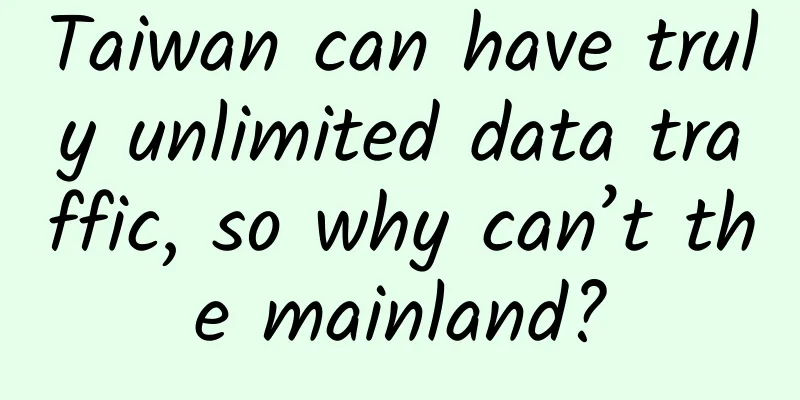Taiwan can have truly unlimited data traffic, so why can’t the mainland?

|
Recently, Beijing Unicom launched a 4G data package with a monthly fee of 46 yuan, which attracted the attention of many netizens. The package is eye-catching because of its unlimited data, but it is not unlimited in fact. When the local data exceeds 1.5G or the national data exceeds 1GB, the Internet speed will be limited to a maximum of 128kbps, and the normal speed will not be restored until the 1st of the next month . Beijing Mobile also has a similar package. This is very embarrassing. Many users who have opened this package complained that although the total amount of data is not limited, the Internet speed has returned to the pre-liberation era and returned to the 2G era. Many people may not know what 128kbps means. The editor almost thought that 128kbps is 128KB/s. At that time, the editor thought, isn’t this a big profit? 128KB/s is equivalent to the previous 3G speed, which is more than enough to watch a clear video. Later, it was proved that the editor was really too naive - 128kbps = 16KB/s - let the editor drink a cup of 82-year-old lemon tea to calm down. Such a package is not actually unlimited data in the true sense. In fact, is there really unlimited traffic in the world? There was unlimited traffic in China, but there were many problems . In the 2G era, there was unlimited traffic in China. In order to compete for customer resources, some local operators once sold some 20 yuan unlimited traffic cards. Because the Internet speed was very slow at that time, and the awareness of mobile Internet access was weak, a user only used 10M of traffic a month, and even if the restrictions were lifted, they would not use much, so the operator sold a 20 yuan unlimited traffic card to encourage users to use it. This was originally a win-win situation, but unexpectedly, the Internet era was developing rapidly and soon entered the 4G era. This card is still 20 yuan, but the Internet speed has greatly improved. In this way, there are many "business opportunities" hidden in it. Some "opportunistic" users use their mobile phones as hotspots to share the Internet in some places without broadband and WIFI, and make profits by charging others. Doing so will also occupy the resources of regular and honest users and affect their Internet speed. After the operator found out, it planned to restrict or forcibly cancel the phone cards of this package, but how could those card owners agree? So there were repeated incidents of attacking business halls. So since then, operators have almost never come up with unlimited traffic to pit themselves. Do other countries or regions in the world have truly unlimited traffic? The editor will take you to the developed and wealthy Republic of the United States to take a look. It turns out that the four major operators in the United States, Sprint, AT&T, T-Mobile and Verizon, also had unlimited Internet packages in the 3G era in order to compete for users. But later in the 4G era, the same situation as in China occurred. Users who purchased this service used mobile phone cards as Internet cards, so the traffic used in a month was not as simple as 1G or 10G. Hundreds of G or even 1T were possible. No operator had such transmission capabilities. As long as a few unlimited traffic customers appeared, a base station might be completely paralyzed. So later these operators had to clean up and forcibly terminated the unlimited traffic by signing only a two-year package agreement. But some operators didn't want to give up such a good gimmick, so they played tricks and still launched the so-called unlimited traffic, but after exceeding a certain amount, the Internet speed would be surprisingly slow. If you want to use it normally, you have to buy a normal traffic package. This is all a routine. Next, let's go to Japan...Hold on, read this article, and then go...NTT DoCoMo is the largest operator in Japan, accounting for nearly half of the Japanese market. It also has a so-called unlimited data package, which is about RMB 325 per month, but there are also strict restrictions. When it exceeds 7GB, the network speed will become 128kbps... South Korea's practice is to use unlimited data for 6 hours a day without speed limits, and enjoy 31GB of data services per month. If it exceeds, the speed limit is 400kbps. Then there is Hong Kong...The editor is very impressed. In 2014, China Mobile launched a 68 Hong Kong dollar unlimited data 3G Internet package in Hong Kong, which attracted crazy complaints from mainland netizens. However, this is really not China Mobile's fault, because this package is not the cheapest in Hong Kong. The original price of this package is HK$128, and it is discounted to HK$68 during the event. In addition, HK$12 is required for the MTR, tunnel, mobile phone service license and administrative fees. This unlimited data actually has certain restrictions. 3G data cannot be used for wireless network sharing, that is, it cannot be used for hotspot sharing network, nor can it be used for P2P functions, that is, it cannot use services such as Thunder: downloading resources from the network that require a lot of data, such as movies, games, etc. In addition, the preferential package is only applicable to mobile phones, and mobile devices with screens larger than 7 inches cannot be used. In addition, China Mobile Hong Kong also specifically noted that the mobile devices applicable to this package will be adjusted from time to time. China Mobile has obviously paved a way out for itself. Later, the editor found that this package will also be limited to 384Kbps, and there will be problems such as high SMS fees and roaming fees outside the network... The editor checked a lot of information and originally thought that there was no truly unlimited data package in the world for the time being. However, a friend who just came back from the Taipei Computer Show told the editor that Taiwan has an unlimited data package, 799 Taiwan dollars (about 163 yuan) per month, and you can use data as you like, and send hotspots as you like ... Since the editor's colleague only went there for a week, it is unknown whether there are other requirements. Taiwan has unlimited data, why not China? In fact, it is unscientific to compare a single region with the whole country. First of all, there are great differences in land area and population. With a small land area and a small population, the cost of networking will be lower. Here, the editor would like to state that Taiwan is part of China. Developed countries like the United States and Japan cannot achieve this, let alone China, which has a large population and a shortage of bandwidth resources? Let me talk to you about the bandwidth of wired and wireless networks. Maybe you will understand that it is not easy to achieve unlimited traffic at present. Many people are confused about the difference between wireless communication and wired broadband . They are all used to surf the Internet. Why can't traffic be used as a monthly unlimited subscription like broadband? In fact, the bandwidth of wired communication is unlimited, while the bandwidth of wireless communication is limited. It is much easier to increase the speed and expand the capacity of wired communication than wireless communication. Is one optical fiber not enough? Then add another one. If it is not enough, add more. Wired broadband can basically reach its theoretical rate. However, for wireless communication, its bandwidth is limited, so the rate increase and capacity expansion are relatively difficult. In addition, due to noise, co-frequency and adjacent frequency interference, the transmission capacity is also greatly reduced. Moreover, wired broadband is a line exclusive to each household. However, wireless is different. Wireless is a shared design, and many users use the same wireless base station. This places very high demands on wireless base stations. Not only do they need to bear greater bandwidth requirements, but they also need to handle the exchange and connection of many signals. The cost is much higher than that of home broadband. Comparison of domestic and foreign traffic charges In recent years, people have inexplicably formed such a concept in their minds that domestic products are always not as good or cheap as those in other countries, and therefore they also think that domestic 4G traffic charges are more expensive than those abroad. Let's take a look at the traffic charges in some other countries. Brazil: According to the latest package information published on the official website of VIVO, Brazil, the charges for 200MB, 500MB and 800MB 4G network packages are 34.99 reais (about RMB 71.77), 49.99 reais (about RMB 102.54) and 64.99 reais (about RMB 133.31) per month, respectively. The price is not cheap. United States: Verizon is currently the world's largest 4G operator. Users pay $50 per month to enjoy 5GB of traffic . Another operator, AT&T, offers monthly packages of 300MB for $20, 3GB for $30, and 5GB for $50. The excess traffic for the two tiers of 3GB and 5GB is charged at $10 per GB. The difference in per capita income makes it not comparable to the United States, but it feels cheaper than Brazil, which is also a developing country. The efforts of the three major operators Last year, the prime minister's words made speed increase and fee reduction a hot word. Now that a year has passed, how is the effect? According to relevant data, the three major operators have saved 40 billion for users last year. Since mid-May last year, the three major telecom operators have launched a number of preferential measures involving speed increase, traffic increase, and package price reduction. At the beginning of this year, at the 2015 Ministry of Industry and Information Technology Summary Conference, the spokesperson specifically mentioned that "China Mobile, China Unicom, and China Telecom have strictly implemented the regulations and achieved the established goals, that is, the average tariff level of fixed broadband and mobile traffic has dropped by more than 50% and 39% respectively." In fact, the editor personally feels that the traffic tariff has still dropped. Traffic management is more practical than unlimited traffic . Unlimited traffic still seems to be far away, but it does not mean that operators can do nothing all the time. It is still very useful to make some reliable efforts. For example, at the end of last month, Guangdong Unicom launched a 4G daily rental card, which includes 500M of traffic for one yuan. Specifically, the monthly rental fee of this daily rental card is 0 yuan, and you only need to pay 6 yuan per month for the caller ID function. The caller charges 0.17 yuan per minute, and the incoming calls are free within the province. There is also a discount of 1 yuan for 500MB of local traffic. You can enjoy 500MB of local traffic on the same day for only 1 yuan, and it will be automatically superimposed after it is used up. This means that you can enjoy nearly 15G of traffic per month for 30 yuan per month. In addition, the methods of directional traffic, daily rental packages, and non-zero traffic are also good ways to reduce traffic charges. In summary: unlimited traffic is not realistic at present. In fact, what consumers care most about is not whether it is unlimited or not, but low price and high speed. It has been 11 years from the GPRS network speed in 2005 to the 4G popularization era in 2016. The network speed has increased by 2,000 times, but the package price has only decreased by three times . We hope that operators can work hard to lower prices and increase speed from the perspective of consumers, rather than just following procedures from the perspective of leaders' requirements. The path we want to take is the path of "lowering prices and increasing speed", rather than the routine of operators full of price traps. As a winner of Toutiao's Qingyun Plan and Baijiahao's Bai+ Plan, the 2019 Baidu Digital Author of the Year, the Baijiahao's Most Popular Author in the Technology Field, the 2019 Sogou Technology and Culture Author, and the 2021 Baijiahao Quarterly Influential Creator, he has won many awards, including the 2013 Sohu Best Industry Media Person, the 2015 China New Media Entrepreneurship Competition Beijing Third Place, the 2015 Guangmang Experience Award, the 2015 China New Media Entrepreneurship Competition Finals Third Place, and the 2018 Baidu Dynamic Annual Powerful Celebrity. |
>>: CEIDCO: 2024 Global Electricity Development Index Research Report
Recommend
Information flow advertising: A guide to optimizing landing pages in the machinery industry!
How can the food machinery industry reduce the ve...
Can the stubborn Netflix break into the 200 billion Chinese video market?
Recently, the news that the American video websit...
Take stock of the characteristics and value of brand loyalty!
Brand loyalty is often mentioned in daily communi...
7 Micro-Interactions to Improve User Experience
As we all know, we always judge a book by its cov...
Cocos Developer Salon——Cocos Studio V2.1 Open Plan
In the era of mobile Internet, the mobile game in...
Surprise! Windows 10 loves to spread your WiFi password
Windows 10's Wi-FiSense feature has a securit...
What are those little insects flying around the trash can at home? Flies? No.
When the trash can at home has not been emptied f...
Understand iQiyi’s regional brand marketing in one picture!
In the era of big screens, smart TVs are highly p...
Stop buying blindly! Regarding "Double Eleven", check this reminder quickly →
Recently, the Beijing Municipal Administration fo...
What brand advantages are needed to use low-price strategies for marketing?
Many people believe that if the product has the s...
A detailed explanation of the formula for live streaming sales
As traffic dividends become increasingly tight, t...
How to accurately check the ranking of Baidu bidding keywords?
When many companies are bidding, they require bid...
Case practice: How can lottery activities attract users?
Last night, there was a very interesting discussi...
How can a live broadcast room with 0 followers obtain high-quality traffic?
What factors lead to the low traffic in Douyin’s ...
Chats can be encrypted! Tencent launches WeChat message encryption app "MiXin"
Recently, Tencent launched a mini program called ...









